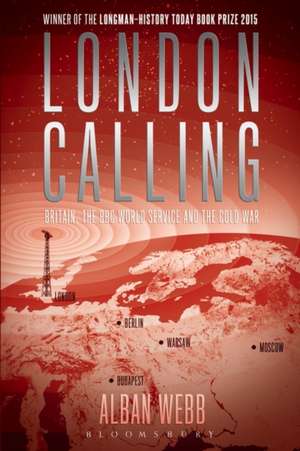London Calling: Britain, the BBC World Service and the Cold War
Autor Dr Alban Webben Limba Engleză Paperback – 22 apr 2015
| Toate formatele și edițiile | Preț | Express |
|---|---|---|
| Paperback (1) | 179.98 lei 3-5 săpt. | |
| Bloomsbury Publishing – 22 apr 2015 | 179.98 lei 3-5 săpt. | |
| Hardback (1) | 774.20 lei 6-8 săpt. | |
| Bloomsbury Publishing – 18 iun 2014 | 774.20 lei 6-8 săpt. |
Preț: 179.98 lei
Preț vechi: 208.35 lei
-14% Nou
Puncte Express: 270
Preț estimativ în valută:
34.44€ • 35.96$ • 28.44£
34.44€ • 35.96$ • 28.44£
Carte disponibilă
Livrare economică 25 martie-08 aprilie
Preluare comenzi: 021 569.72.76
Specificații
ISBN-13: 9781474227490
ISBN-10: 147422749X
Pagini: 264
Ilustrații: 10 illus
Dimensiuni: 156 x 234 x 15 mm
Greutate: 0.41 kg
Editura: Bloomsbury Publishing
Colecția Bloomsbury Academic
Locul publicării:London, United Kingdom
ISBN-10: 147422749X
Pagini: 264
Ilustrații: 10 illus
Dimensiuni: 156 x 234 x 15 mm
Greutate: 0.41 kg
Editura: Bloomsbury Publishing
Colecția Bloomsbury Academic
Locul publicării:London, United Kingdom
Caracteristici
Important study for historians interested in the Cold War, media history and British political history
Notă biografică
Alban Webb is a historian and Lecturer in Digital Humanities at the University of Sussex, UK. He is also Associate on the Cold War Studies Programme at the London School of Economics and Political Science, UK.
Cuprins
Introduction \ Part I - From Total War to Cold War \ 1. Planning for Peace \ 2. The Home Front \ 3. The Cold War Challenge \ Part II - Inter-National Service \ 4. The Imagined Audience \ 5. The Radio Arms Race \ Part III - Global Reach \ 6. Mapping the Cold War \ 7. Austerity Britain \ Part IV - Battlefields \ 8. The Soviet Challenge \ 9. Hungary \ 10. Suez \ Conclusion \ Bibliography \ Index
Recenzii
Webb guides the reader through the intricacies of FO and BBC politics with great verve. He uses the BBC Written Archives (which are rarely consulted by historians) to tremendous effect ... Scholarly and accessible, London Calling is a fine read and a worthy winner of the Longman-History Today Book Prize.
It is not often a book about radio wins a prize. Nevertheless, London Calling: Britain, the BBC World Service and the Cold War by Alan Webb is an exception ... What makes this book important is the author's recognition of the significance of external broadcasting in global politics ... I wish Dr Webb well in his academic career and hope that there will be a second volume looking at the history of the BBC World Service from the 1960s onwards.
Alban Webb's meticulously researched account of the postwar wrangling between government and the BBC not only provides fascinating detail but also offers a narrative and perspective which allows us to see its relevance today.
Alban Webb's London Calling: Britain, the BBC World Service and the Cold War won the 2015 Longman-History Today Book Prize. That honor might attract your attention to the book. However, understanding how the leaders of the BBC External Service (renamed the World Service in 1965) fought to maintain a Western standard of journalistic objectivity amid internal and external pressures because of the commencement of the Cold War will keep you engaged in it.
At the heart of Webb's valuable study is the awkward accommodation that took shape between government and corporation ... about the scope, remit, funding and oversight of the BBC's global services.
This is what a good history should do: both reveal new narratives as well as whet our anticipation for other good stories that might be told. Alban Webb has given us in London Calling, with all the hallmarks, a good BBC history.
Alban Webb expertly reveals the special war of the ether which West and East waged against each other during the all-too-tangible Cold War. In these pages the aerials hum once more and the men and women who made them do so, to considerable effect, also breathe again.
London Calling highlights an important, but often neglected area of study in the history of international public diplomacy. Webb shows the BBC External Services' key role, that was later renamed the BBC World Service during 1965, in the pivot from the Second World War to the early cold war. He successfully details how the BBC was on the 'frontline' of responding to international Communism and shows the intricacies of radio programming in geopolitics.
This book is a pioneering account of the British national security context of the BBC's external broadcasting from World War II to 1957. .[I]t offers a valuable comparative perspective to readers familiar with the history of US international broadcasting and public diplomacy during the Cold War.
It is not often a book about radio wins a prize. Nevertheless, London Calling: Britain, the BBC World Service and the Cold War by Alan Webb is an exception ... What makes this book important is the author's recognition of the significance of external broadcasting in global politics ... I wish Dr Webb well in his academic career and hope that there will be a second volume looking at the history of the BBC World Service from the 1960s onwards.
Alban Webb's meticulously researched account of the postwar wrangling between government and the BBC not only provides fascinating detail but also offers a narrative and perspective which allows us to see its relevance today.
Alban Webb's London Calling: Britain, the BBC World Service and the Cold War won the 2015 Longman-History Today Book Prize. That honor might attract your attention to the book. However, understanding how the leaders of the BBC External Service (renamed the World Service in 1965) fought to maintain a Western standard of journalistic objectivity amid internal and external pressures because of the commencement of the Cold War will keep you engaged in it.
At the heart of Webb's valuable study is the awkward accommodation that took shape between government and corporation ... about the scope, remit, funding and oversight of the BBC's global services.
This is what a good history should do: both reveal new narratives as well as whet our anticipation for other good stories that might be told. Alban Webb has given us in London Calling, with all the hallmarks, a good BBC history.
Alban Webb expertly reveals the special war of the ether which West and East waged against each other during the all-too-tangible Cold War. In these pages the aerials hum once more and the men and women who made them do so, to considerable effect, also breathe again.
London Calling highlights an important, but often neglected area of study in the history of international public diplomacy. Webb shows the BBC External Services' key role, that was later renamed the BBC World Service during 1965, in the pivot from the Second World War to the early cold war. He successfully details how the BBC was on the 'frontline' of responding to international Communism and shows the intricacies of radio programming in geopolitics.
This book is a pioneering account of the British national security context of the BBC's external broadcasting from World War II to 1957. .[I]t offers a valuable comparative perspective to readers familiar with the history of US international broadcasting and public diplomacy during the Cold War.







